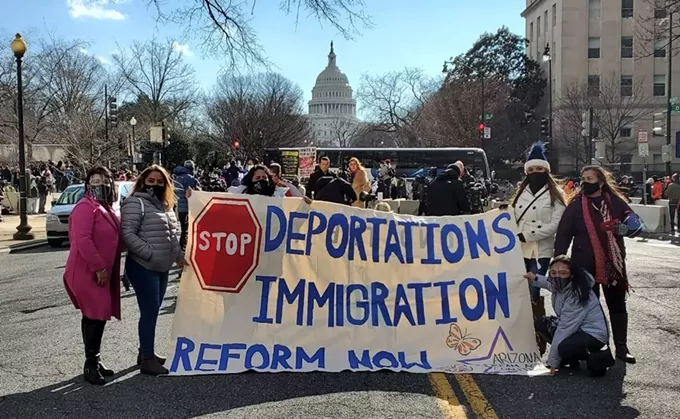Wednesday, November 24, 2021
In lieu of path to citizenship, advocates cheer immigration reforms in spending bill
While a pathway to citizenship was nixed in the most recent version of the Build Back Better Act, a flagship legislation part of President Joe Biden’s agenda, the Congressional Hispanic Caucus and immigration advocates still welcome the protections from deportation expected to impact about 6.5 million undocumented immigrants.
Under the House version of the spending bill, Democrats included the third iteration of an immigration plan in the Build Back Better Act. A previous version of the legislation included a pathway to citizenship for certain undocumented immigrants, such as people brought to the country as children, essential workers, farmworkers and those with Temporary Protected Status. That provision was removed from the bill following a ruling by the Senate’s parliamentarian.
During a press conference on Monday, Rep. Raul Ruiz, D-Calif., who chairs the 38-member caucus, explained that legislators instead proposed a parole program that would provide temporary protections of deportation, a five-year work permit and driver’s license to eligible undocumented immigrants who pass a background check.
The driver’s license would be available in states like Arizona that currently don’t issue them to undocumented residents. The driver’s licenses will be required to meet federal requirements for identification in domestic airports, allowing immigrants to travel by air without fear of encountering federal immigration enforcement.
The version of the immigration plan in the budget legislation that passed the House applies to people living in the U.S. with no immigration status who arrived in the country before Jan. 1, 2011. They must also meet certain criteria related to criminal record, similar to the current requirements for the Deferred Action for Childhood Arrivals program, said attorney Ray Ybarra Maldonado in an explainer video posted on Facebook.
For months, immigration advocates have pushed federal lawmakers to pass citizenship for millions within the budget reconciliation process this year.
Juliana Macedo do Nascimento, of United We Dream, an organization that advocates for immigration reform, said groups will continue pressuring the Senate.
“This is far from the relief that our immigrant communities deserve, it’s not what they promised us but we know it will be life-changing. The fight is not over. (Democrats) can still deliver on their promise of a pathway to citizenship,” she said.
Ruiz said the version of the bill that the House approved last week will cut the costs of child care, health care and housing for most Americans. The universally subsidized preschool and the expanded child tax credit will help Americans who are still bearing the brunt of the economic downturn caused by the pandemic, he said.
U.S. Health and Human Services Secretary Xavier Becerra, who also spoke in the press call, explained the plan will be entirely paid for by tax increases on high-income earners and corporations. He said the plan is intended to benefit people like his parents, families like his.
“My dad worked picking crops and in construction of roads, my mom in hospital offices. They never earned a lot, but they worked a lot,” Becerra said. “We are investing in them, in those families that want to give much more.”
United We Dream explained that undocumented children will also be able to use their Individual Taxpayer Identification Number to apply for the expanded child tax credit under Build Back Better. Immigrants with no authorization to work in the U.S. use ITIN to file taxes with the Internal Revenue Service. Currently, a Social Security number is needed to be eligible for the payment, which under BBB would be of $250 or $300 monthly, depending on the age of the child.
Ruiz urged the Senate to keep immigration provisions that will create a parole program for millions of undocumented immigrants, and expand the plan to provide a pathway to citizenship.
The legislation faces a tough and lengthy path — and some likely changes — in the evenly divided Senate, where Democrats will need every vote in their caucus for the measure to reach Biden’s desk.
The Senate will use a legislative procedure known as budget reconciliation, which allows Democrats to bypass the 60-vote threshold needed to break a Republican filibuster.
During a Friday press conference with U.S. Transportation Secretary Pete Buttigieg in Phoenix, Democratic U.S. Sens. Kyrsten Sinema and Mark Kelly didn’t commit to supporting the Build Back Better Act as passed in the House, but said they’ll continue negotiating on the plan.
Arizona Mirror is part of States Newsroom, a network of news bureaus supported by grants and a coalition of donors as a 501c(3) public charity. Arizona Mirror maintains editorial independence. Contact Editor Jim Small for questions: info@azmirror.com. Follow Arizona Mirror on Facebook and Twitter.












